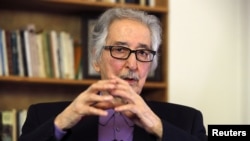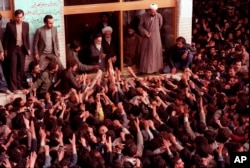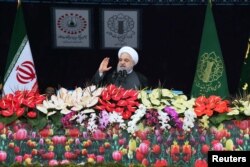Forty years have passed since the Iranian Revolution in which the U.S.-backed government of Shah Mohammad Reza Pavlavi collapsed and the Islamic Republic was born. The events also saw the return to Iran of Supreme Leader Ayatollah Ruhollah Khomeini after 14 years in exile in France. Now, Iran's first elected president, who was later ousted by Khomeini, tells VOA that he and many of his fellow revolutionaries felt betrayed by the ayatollah, whom they never realized intended to set up a new dictatorship.
For those who remember Iran's 1979 revolution, the moment that Ayatollah Ruhollah Khomeini's plane arrived in Tehran from Paris was the moment when the old monarchic regime of Shah Mohammed Reza Pahlavi collapsed, giving way to the new Islamic Republic.
Abolhassan Bani Sadr, who became Iran's first elected president shortly thereafter, was on board that historic flight from Paris to Tehran, and recalls for VOA how he felt when the plane landed at Tehran's Mehrabad Airport.
He says that we were full of hope and almost completely convinced that the objectives and principles of the revolution, which were put forward by (Ayatollah Khomeini) would be achieved, and that (Khomeini) would be a barrier to all those forces seeking to return the country to the past.
When asked if he was surprised by the turn of events when Khomeini began to show his inclination for a new authoritarian regime based on Shi'ite Islam, Bani Sadr says it was unthinkable that a religious leader would lie to the people.
Bani Sadr says he was nearly certain that religious leaders don't lie and have no desire to seek power for themselves, since the role of religious figures in Iran, historically, has been to take the lead in criticizing those in power, especially dictators. So, he says he could not imagine a new dictatorship, as was the case in France or Russia, where dictatorships were restored after revolutions.
Bani Sadr recalls how he was elected president by a massive majority of the people, following the revolution, but says Khomeini told his entourage that, "Even if 35 million people [out of a 1979 population of 38 million people] said 'yes' to something, he would say 'no.'"
Months into the revolution, after Iran's new draft constitution was approved, Bani Sadr says he and his supporters finally realized that Khomeini was not interested in handing power over to the people, but rather sought to wield power himself, after setting up the new "Council of Experts" to ratify decisions by elected officials.
Bani Sadr argues that Ayatollah Khomeini would never have been able to seize power and oust him as president had it not been for the disastrous eight-year war against Saddam Hussein's Iraq from 1980 to 1988.
Mehrdad Khonsari, who was press attache at the Iranian embassy in London when the shah was ousted, tells VOA that he "never imagined that a revolution would succeed in toppling the shah."
"I didn't see the collapse of the regime or even a scenario in which the shah would leave the country... I [also] didn't envision that [the new Islamic Republic] would last for 40 years before some kind of relief or freedom would come upon us... which [still hasn't happened] so far."
In his view, the effects of Iran's 1979 revolution can be explained simply by a recent law by the current Iranian parliament, "removing four decimal points from the Iranian currency, one for each decade of the Islamic Republic."
"The U.S. dollar today is worth 2,000 times more than it was 40 years ago. And that, in short, is the story of the Iranian people and the suffering they have endured as a consequence of submitting [to a new political order] which they did not [understand]," he said.
Khonsari argues that the negative effects of the last revolution make the Iranian people "apprehensive at this time in terms of wanting to opt for something new."
On Monday's anniversary, Iranian President Hassan Rouhani told a rally in Tehran that the country's enemies will not achieve what he called their evil goals. Crowds also chanted, "Death to America" and "Death to Israel." Last year, the United States withdrew from a nuclear deal on limiting Iran's nuclear work and reimposed tough sanctions.







